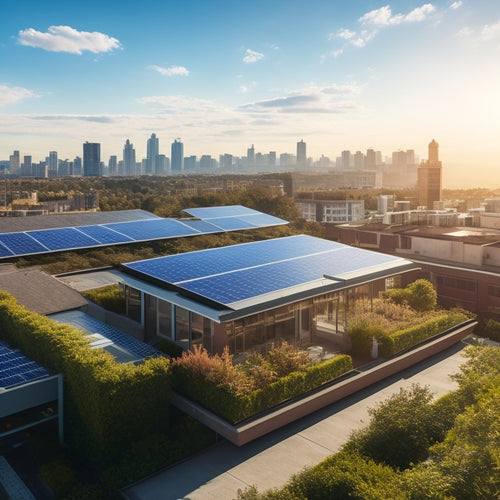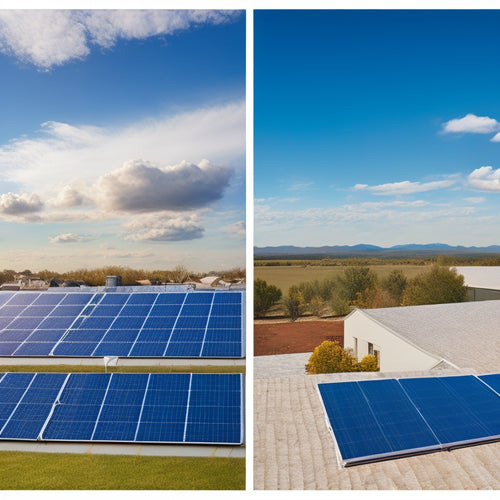
3 Best Home Panel Installation Cost Breakdowns
Share
You're considering installing solar panels on your home, and understanding the cost breakdown is essential to making an informed decision, with a typical residential installation costing between $15,000 to $23,000. The average cost includes solar panels, inverters, mounting hardware, and other necessary equipment. Labor costs account for 10-20% of the total, with permits and inspections adding another 10%. Equipment cost is the largest component, making up 50% of the total system cost. By understanding these cost breakdowns, you'll be better equipped to navigate the installation process and make smart financial decisions - and there's more to discover about optimizing your investment.
Key Takeaways
• The average cost of solar panels for a typical residential installation ranges from $15,000 to $23,000, including equipment and labor.
• Labor costs account for 10% to 20% of the total installation cost, amounting to $1,500 to $3,000 for a typical residential solar panel system.
• Equipment costs, including solar panels, inverters, and mounting hardware, make up 50% of the total system cost.
• Permits, inspections, and certifications add up to 10% of the total system cost, varying by location, with permit fees ranging from $500 to $1,000.
• Federal incentives, such as the Solar Investment Tax Credit (ITC), and state policies can reduce upfront costs, making solar panel installation more affordable for homeowners.
Average Cost of Solar Panels
You can expect to pay between $2.50 and $3.50 per watt for a standard solar panel system, which translates to a total average cost of $15,000 to $23,000 for a typical residential installation.
This cost includes the solar panels themselves, inverters, mounting hardware, and other necessary equipment.
However, your total cost may vary depending on several factors, including the size of your system, local labor costs, and any additional features you may want.
Fortunately, there are ways to reduce your upfront costs.
You may be eligible for Federal incentives, such as the Solar Investment Tax Credit (ITC), which allows you to claim a tax credit of 26% of your total solar panel system cost.
Additionally, many states offer their own incentives, such as rebates, tax credits, or exemptions from sales taxes or property taxes.
For example, some states offer a property tax exemption for the added value of a solar panel system.
Be sure to research your State policies to take advantage of these cost-saving opportunities.
Installation Labor Costs Explained
Labor costs account for approximately 10% to 20% of the total installation cost, which can amount to $1,500 to $3,000 for a typical residential solar panel system.
As you plan your solar panel installation, it's vital to understand the labor costs involved. You'll need to factor in the cost of hiring a licensed electrician, who'll supervise the installation and guarantee that it meets local building codes and safety standards. Their role is vital, as they'll handle the electrical connections and make certain a safe and efficient system.
Permit fees are another labor cost to factor in. Your installation company will need to obtain necessary permits from your local government, which can add up to $500 to $1,000 to your overall cost.
Additionally, you may need to pay for inspections and certifications, which can add to the labor costs.
Total System Cost Breakdown
Breaking down the total system cost into its constituent parts reveals that the average residential solar panel system can be divided into four primary components: equipment, installation labor, permits, and operational costs.
You'll find that each of these system components contributes substantially to the overall cost of your solar panel installation.
The equipment cost, which includes the solar panels, inverters, and mounting hardware, typically accounts for around 50% of the total system cost.
Installation labor costs, which we discussed earlier, make up another 30%.
Permits and inspections, which vary by location, account for around 10%, while operational costs, including maintenance and monitoring, make up the remaining 10%.
It's essential to understand these system components to optimize your solar panel installation's financial performance.
You can take advantage of financial incentives, such as the federal solar investment tax credit (ITC), to offset a substantial portion of your total system cost.
Frequently Asked Questions
Can I Install Solar Panels on My Own to Save Money?
You're considering installing solar panels yourself to save money, but beware: DIY challenges and safety risks abound. Without proper training, you may void warranties, compromise efficiency, and even risk electrical shock or falls from heights.
How Long Does It Take to Install a Solar Panel System?
You'll typically spend 1-3 days waiting for permits, and 2-5 days on installation, depending on system size and complexity, with labor costs accounting for 10-20% of the total installation timeline.
Do Solar Panels Work During a Power Outage?
As you're enjoying your morning coffee, a sudden power outage hits - but you're prepared. Your solar panels, with a battery backup system, provide grid independence, guaranteeing emergency power during outages, so you stay in control.
Can I Add More Panels to My System Later?
You can easily expand your system later, adding more panels as energy needs increase, allowing for seamless system expansion and energy upgrades, ensuring you maintain control over your renewable energy output.
Are There Any Solar Panel Warranties or Guarantees?
You'll typically find solar panel manufacturers offering 25-year warranties on their products, with some providing extended coverage options; be sure to review the manufacturer's obligations and warranty terms to guarantee you're protected.
Related Posts
-

What You Need to Know About Permits and Inspections
You need to navigate the complex landscape of permits and inspections to guarantee your project complies with local z...
-

What Is the Cost to Put in Solar Panels
You're likely considering solar panels for your home, and the most significant factor in your decision is the upfront...
-

Tracking Solar Panels Vs Fixed Panels Cost Savings
When considering solar panel options, you'll want to weigh the cost savings of tracking solar panels versus fixed pan...


